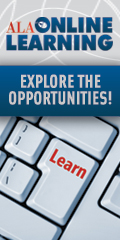4/17/17 [eCourse] Story-a-thon: Creating Community Partnerships to Enhance Access to Literacy Services for Children with Disabilities
Learn how to break down the walls of your library/facility to develop community partnerships specific to the disability community. Examine how their library/facility defines outreach, identify their current services for children with disability, how these services can be enhance as outreach services and programs, and how initiate outreach programming. Then develop an outreach backpack to use upon completion.
4/20/17 [Webinar] From Theory to Practice: Outreach to Underserved Patron Populations
This 90-minute webinar focuses on increasing participants’ level of understanding of the library and information needs of individuals who are considered “traditionally underserved”. Traditionally underserved populations include (but are not limited to) patrons who: have disabilities, are currently or formerly incarcerated, are English language learners, are homeless, are members of the lesbian/gay/bisexual/transgendered community. During this webinar, we’ll discuss the components of cultural competence, learn principles of inclusion for all library user groups, and articulate strategies that can be implemented in the library in order to provide more effective outreach to underserved library user groups.
4/25/17 [Webinar] Not to be Forgotten: Providing Library Services for People Living with Dementia
Library services to this growing and often overlooked population are currently scarce. See what some of your peers are doing around the nation to assist this population, learn tips for effective communication, and explore resources available to help. Libraries have a unique role in uplifting this population.
5/1/17 [eCourse] Build Your Professional Brand and Get Published
This course is intended for librarians who want to share their library expertise through publications, including books, magazines, blogs and other media. The content in the course will help librarians develop their personal brand by leveraging their knowledge into writing that benefits their brand and the profession as a whole.
5/1/17 [eCourse] Building a Successful Independent Consulting Practice
This course will guide participants through the exploration and quantification of their uniquely marketable skills and expertise in order to build and launch a successful consulting practice. Using carefully curated resources and experience, the instructor will help each participant design and build a strategy for launching a consulting practice in their area of expertise. This course will cover building a brand, finding a niche to serve, marketing your services, and how to find and land business. Participants will leave with actionable strategies and plans for their own practice. This course is geared towards the independent consultant.
5/17/17 [Webinar] Ebook innovation + publisher collaboration = library domination @ your library
Libraries have the power to drive ebook discovery because they know what people need and read in their communities. Hear about how we (a library consortium in Illinois) created partnerships with publishers and an ebook vendor with a project called PopUp Picks to leverage library expertise to connect community members to their next great read and increase community engagement.
About ASCLA
The Association of Specialized and Cooperative Library Agencies (ASCLA), a division of the American Library Association, offers convenient, year round online learning opportunities to further your knowledge and career skills. ASCLA’s online courses and webinars focus on topics related accessibility and outreach to underserved patrons as well as topics related to state and specialized libraries, prison libraries, library cooperatives and library consultants. ASCLA members qualify for discounted registration rates including discounts on group registrations. Courses and webinars are open to the public.

